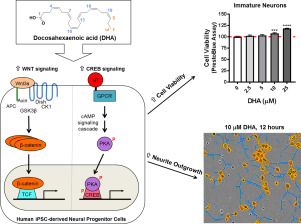当前位置:
X-MOL 学术
›
Mol. Cell. Neurosci.
›
论文详情
Our official English website, www.x-mol.net, welcomes your
feedback! (Note: you will need to create a separate account there.)
Activation of WNT and CREB signaling pathways in human neuronal cells in response to the Omega-3 fatty acid docosahexaenoic acid (DHA).
Molecular and Cellular Neuroscience ( IF 2.6 ) Pub Date : 2019-06-14 , DOI: 10.1016/j.mcn.2019.06.006 Wen-Ning Zhao 1 , Norma K Hylton 2 , Jennifer Wang 3 , Peter S Chindavong 1 , Begum Alural 4 , Iren Kurtser 1 , Aravind Subramanian 5 , Ralph Mazitschek 6 , Roy H Perlis 3 , Stephen J Haggarty 1
Molecular and Cellular Neuroscience ( IF 2.6 ) Pub Date : 2019-06-14 , DOI: 10.1016/j.mcn.2019.06.006 Wen-Ning Zhao 1 , Norma K Hylton 2 , Jennifer Wang 3 , Peter S Chindavong 1 , Begum Alural 4 , Iren Kurtser 1 , Aravind Subramanian 5 , Ralph Mazitschek 6 , Roy H Perlis 3 , Stephen J Haggarty 1
Affiliation

|
A subset of individuals with major depressive disorder (MDD) elects treatment with complementary and alternative medicines (CAMs), including the omega-3 fatty acids docosahexaenoic acid (DHA) and eicosapentaenoic acid (EPA). Previous studies in rodents suggest that DHA modulates neurodevelopmental processes, including adult neurogenesis and neuroplasticity, but the molecular and cellular mechanisms of DHA's potential therapeutic effect in the context of human neurobiology have not been well established. Here we sought to address this knowledge gap by investigating the effects of DHA using human iPSC-derived neural progenitor cells (NPCs) and post-mitotic neurons using pathway-selective reporter genes, multiplexed mRNA expression profiling, and a panel of metabolism-based viability assays. Finally, real-time, live-cell imaging was employed to monitor neurite outgrowth upon DHA treatment. Overall, these studies showed that DHA treatment (0-50 μM) significantly upregulated both WNT and CREB signaling pathways in human neuronal cells in a dose-dependent manner with 2- to 3-fold increases in pathway activation. Additionally, we observed that DHA treatment enhanced survival of iPSC-derived NPCs and differentiation of post-mitotic neurons with live-cell imaging, revealing increased neurite outgrowth with DHA treatment within 24 h. Taken together, this study provides evidence that DHA treatment activates critical pathways regulating neuroplasticity, which may contribute to enhanced neuronal cell viability and neuronal connectivity. The extent to which these pathways represent molecular mechanisms underlying the potential beneficial effects of omega-3 fatty acids in MDD and other brain disorders merits further investigation.
中文翻译:

响应 Omega-3 脂肪酸二十二碳六烯酸 (DHA),激活人类神经细胞中的 WNT 和 CREB 信号通路。
部分重度抑郁症 (MDD) 患者选择补充和替代药物 (CAM) 治疗,包括 omega-3 脂肪酸二十二碳六烯酸 (DHA) 和二十碳五烯酸 (EPA)。先前对啮齿动物的研究表明,DHA 调节神经发育过程,包括成年神经发生和神经可塑性,但 DHA 在人类神经生物学背景下潜在治疗作用的分子和细胞机制尚未明确。在这里,我们试图通过使用人 iPSC 衍生的神经祖细胞 (NPC) 和有丝分裂后神经元,使用途径选择性报告基因、多重 mRNA 表达谱和一组基于代谢的活力来研究 DHA 的影响,以弥补这一知识差距化验。最后,采用实时活细胞成像来监测 DHA 治疗后神经突的生长。总体而言,这些研究表明,DHA 处理(0-50 μM)以剂量依赖性方式显着上调人类神经元细胞中的 WNT 和 CREB 信号通路,通路激活增加 2 至 3 倍。此外,我们通过活细胞成像观察到,DHA 治疗增强了 iPSC 衍生的 NPC 的存活率和有丝分裂后神经元的分化,揭示了 DHA 治疗在 24 小时内增加了神经突的生长。总而言之,这项研究提供的证据表明 DHA 治疗可激活调节神经可塑性的关键途径,这可能有助于增强神经元细胞活力和神经元连接性。这些途径在多大程度上代表了 omega-3 脂肪酸对 MDD 和其他脑部疾病的潜在有益作用的分子机制,值得进一步研究。
更新日期:2019-06-14
中文翻译:

响应 Omega-3 脂肪酸二十二碳六烯酸 (DHA),激活人类神经细胞中的 WNT 和 CREB 信号通路。
部分重度抑郁症 (MDD) 患者选择补充和替代药物 (CAM) 治疗,包括 omega-3 脂肪酸二十二碳六烯酸 (DHA) 和二十碳五烯酸 (EPA)。先前对啮齿动物的研究表明,DHA 调节神经发育过程,包括成年神经发生和神经可塑性,但 DHA 在人类神经生物学背景下潜在治疗作用的分子和细胞机制尚未明确。在这里,我们试图通过使用人 iPSC 衍生的神经祖细胞 (NPC) 和有丝分裂后神经元,使用途径选择性报告基因、多重 mRNA 表达谱和一组基于代谢的活力来研究 DHA 的影响,以弥补这一知识差距化验。最后,采用实时活细胞成像来监测 DHA 治疗后神经突的生长。总体而言,这些研究表明,DHA 处理(0-50 μM)以剂量依赖性方式显着上调人类神经元细胞中的 WNT 和 CREB 信号通路,通路激活增加 2 至 3 倍。此外,我们通过活细胞成像观察到,DHA 治疗增强了 iPSC 衍生的 NPC 的存活率和有丝分裂后神经元的分化,揭示了 DHA 治疗在 24 小时内增加了神经突的生长。总而言之,这项研究提供的证据表明 DHA 治疗可激活调节神经可塑性的关键途径,这可能有助于增强神经元细胞活力和神经元连接性。这些途径在多大程度上代表了 omega-3 脂肪酸对 MDD 和其他脑部疾病的潜在有益作用的分子机制,值得进一步研究。











































 京公网安备 11010802027423号
京公网安备 11010802027423号